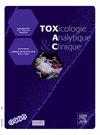The use of artificial intelligence in forensic toxicology
IF 1.8
Q4 TOXICOLOGY
引用次数: 0
Abstract
Objectives
The integration of artificial intelligence (AI) into forensic toxicology has the potential to revolutionize this domain by enhancing efficiency, and interpretability of toxicological analyses. AI technologies, including machine learning (ML), deep learning, generative AI and expert systems offer advanced data analysis capabilities that can significantly improve the way forensic toxicologists will work in the future. These systems can enhance efficiency by automating time-intensive laboratory processes, offering significant advancements in the detection of compounds, and processing of data, whilst reducing human error. Techniques such as natural language processing (NLP) are employed to extract relevant information from scientific literature, enhancing the knowledge base available to forensic toxicologists. Other AI models are trained on extensive datasets comprising chemical structures, toxicological outcomes, and biological assay results, to finally predict the toxicity of new compounds, automate the identification of substances in biological samples, and assist in the interpretation of complex toxicological data.
Methods
The opportunities and challenges associated with implementing the different AI technologies in forensic toxicology, with a focus on generative AI, expert systems, and ML will be reviewed. In addition, a summary of the aims and tasks of ‘The International Association of Forensic Toxicologists’ (TIAFT) Task Force concerning AI will be discussed.
Results
This summary provides a review of the current integration of AI into forensic toxicology, highlighting its potential to revolutionize the field by increasing efficiency, enhancing interpretability, and supporting forensic investigations. Key findings include (a) the potential of NLP and generative AI to automate literature reviews and report generation, (b) use of expert systems for rapid drug identification in biological samples, and (c) ML models for interpreting complex toxicological data, such as drug interactions and biomarker detection.
Discussion
Despite the clear benefits of AI, the integration of AI in forensic toxicology faces several challenges. These include ensuring data quality and accessibility, addressing ethical concerns related to data privacy and algorithmic bias, and achieving regulatory acceptance of AI-driven methodologies. Transparent and explainable AI models are crucial for gaining trust within the forensic community and ensuring responsible use of technology.
Conclusion
The incorporation of AI into forensic toxicology holds promise for enhancing the accuracy, efficiency, and reliability of toxicological analyses. By leveraging AI technologies, forensic toxicologists can improve their ability to detect and interpret toxic substances, ultimately contributing to more effective forensic investigations and public safety. Machines will not replace toxicologists, but toxicologists using AI will likely replace those not using it.
人工智能在法医毒理学中的应用
目的将人工智能(AI)集成到法医毒理学中,通过提高效率和毒理学分析的可解释性,有可能彻底改变这一领域。包括机器学习(ML)、深度学习、生成式人工智能和专家系统在内的人工智能技术提供了先进的数据分析能力,可以显著改善法医毒理学家未来的工作方式。这些系统可以通过自动化时间密集型实验室流程来提高效率,在化合物检测和数据处理方面取得重大进展,同时减少人为错误。使用自然语言处理(NLP)等技术从科学文献中提取相关信息,增强法医毒理学家可用的知识库。其他人工智能模型在广泛的数据集上进行训练,包括化学结构、毒理学结果和生物分析结果,最终预测新化合物的毒性,自动识别生物样品中的物质,并协助解释复杂的毒理学数据。方法将回顾在法医毒理学中实施不同人工智能技术的机遇和挑战,重点是生成式人工智能、专家系统和机器学习。此外,还将讨论“国际法医毒理学家协会”(TIAFT)工作组关于人工智能的目标和任务的总结。本综述综述了目前人工智能与法医毒理学的整合,强调了人工智能通过提高效率、增强可解释性和支持法医调查来彻底改变该领域的潜力。主要发现包括(a) NLP和生成式人工智能在自动化文献综述和报告生成方面的潜力,(b)使用专家系统在生物样品中快速识别药物,以及(c) ML模型用于解释复杂的毒理学数据,如药物相互作用和生物标志物检测。尽管人工智能有明显的好处,但人工智能在法医毒理学中的整合面临着几个挑战。其中包括确保数据质量和可访问性,解决与数据隐私和算法偏见相关的道德问题,以及实现监管机构接受人工智能驱动的方法。透明和可解释的人工智能模型对于获得法医界的信任和确保负责任地使用技术至关重要。结论将人工智能应用于法医毒理学,有望提高毒理学分析的准确性、效率和可靠性。通过利用人工智能技术,法医毒理学家可以提高他们检测和解释有毒物质的能力,最终有助于更有效的法医调查和公共安全。机器不会取代毒理学家,但使用人工智能的毒理学家可能会取代那些不使用人工智能的人。
本文章由计算机程序翻译,如有差异,请以英文原文为准。
求助全文
约1分钟内获得全文
求助全文

 求助内容:
求助内容: 应助结果提醒方式:
应助结果提醒方式:


